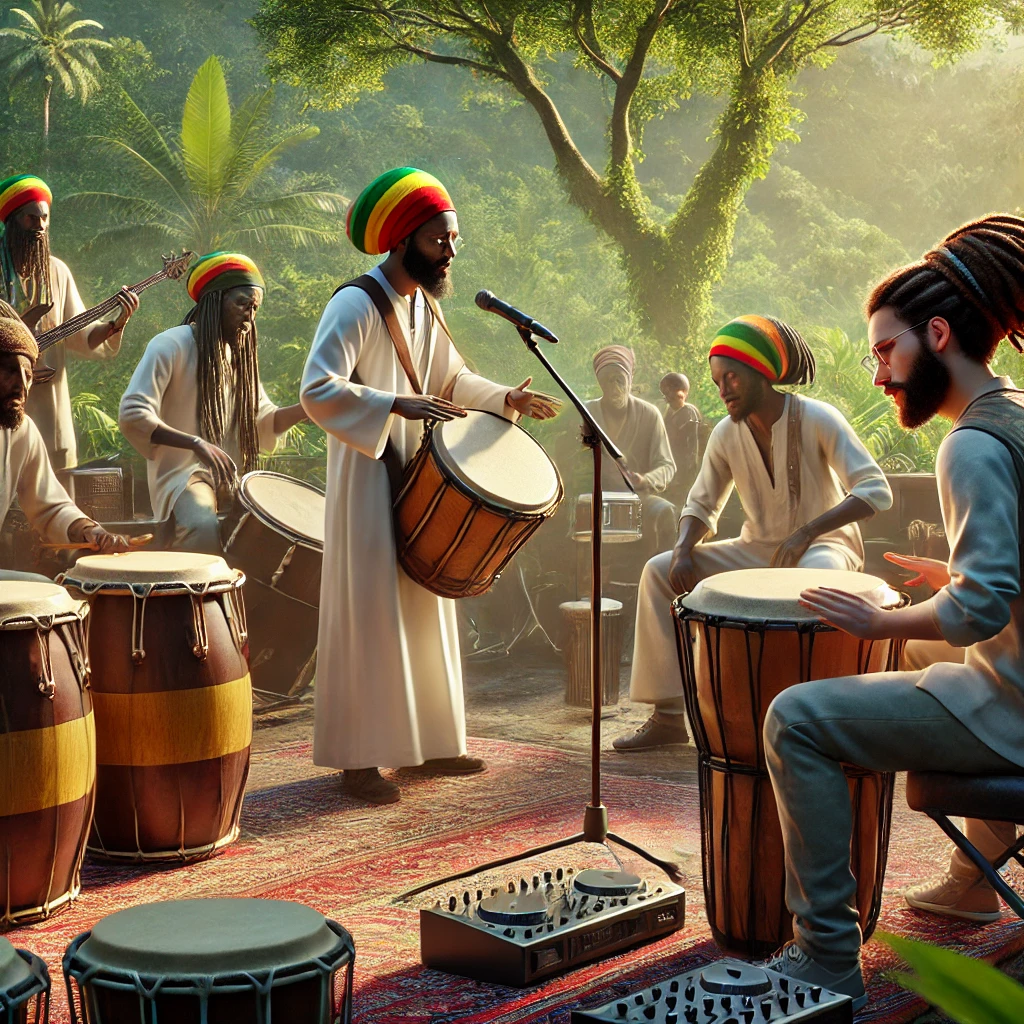Introduction:
Waagwan, mi bredren an’ sistren! When we talk about Rasta music, reggae often takes the spotlight. But there’s a whole world of musical expression within Rastafari that goes beyond reggae’s familiar beats. Two of these powerful forms are Nyabinghi drumming and dub poetry. Let’s explore how these musical styles reflect the heart and soul of Rastafari, spreading messages of unity, resistance, and spirituality.
Nyabinghi Drumming: The Heartbeat of Rastafari
Nyabinghi drumming is often referred to as the heartbeat of Rastafari. It’s a sacred form of music that has deep spiritual significance within the Rasta community. The drumming is named after the Nyabinghi order, which was a resistance movement in East Africa. The rhythms of Nyabinghi drumming are slow, steady, and meditative, creating a powerful connection to Jah and the earth.
The Spiritual Essence of Nyabinghi
Nyabinghi drumming is not just music—it’s a form of worship. The drums are played during Nyabinghi gatherings, which are spiritual ceremonies that involve chanting, drumming, and reasoning. These gatherings are a way for Rastas to connect with Jah, seek guidance, and strengthen their faith. The drumming is accompanied by chants that often praise Jah and Haile Selassie I, calling for peace, unity, and resistance against oppression.
The Three Drums of Nyabinghi
Nyabinghi drumming typically involves three types of drums: the bass drum (also known as the “Thunder”), the funde drum (the “Heartbeat”), and the repeater drum (the “Pecho”). Each drum has a unique role in creating the rhythmic foundation of the music:
- Bass Drum (Thunder): Provides the deep, resonant beats that symbolize the earth and the strength of Jah.
- Funde (Heartbeat): Maintains a steady, pulse-like rhythm that represents the heartbeat of the community.
- Repeater (Pecho): Adds improvisational patterns and higher-pitched accents, symbolizing the voice of the people.
Dub Poetry: The Voice of the People
Dub poetry is another powerful form of Rasta expression that goes beyond reggae. It’s a genre that combines spoken word poetry with the rhythmic backdrop of dub music. Dub poetry emerged in the 1970s as a way for Rasta poets to address social and political issues, using their words to inspire change and resist oppression.
The Origins and Influences of Dub Poetry
Dub poetry has its roots in both reggae music and the oral traditions of the African diaspora. Influenced by the rhythmic patterns of reggae and the storytelling techniques of griots, dub poetry became a way for Rastas to express their thoughts on topics like colonialism, poverty, racism, and spirituality. The poets’ voices are often accompanied by minimalistic dub beats, which enhance the impact of their words.
Notable Dub Poets
Some of the most influential dub poets include:
- Linton Kwesi Johnson: Known as the “father of dub poetry,” Johnson’s works address issues of racial inequality, police brutality, and social justice. His poetry is powerful, direct, and deeply rooted in the experiences of the Black community.
- Mutabaruka: A prominent Rasta poet and musician, Mutabaruka’s dub poetry covers a wide range of topics, from spiritual awakening to political resistance. His voice is a strong advocate for the Rasta movement and the fight for human rights.
- Jean “Binta” Breeze: One of the few female voices in dub poetry, Breeze brings a unique perspective to the genre, addressing themes of womanhood, identity, and social change.
The Power of Words and Rhythm
Dub poetry is a testament to the power of words and rhythm in Rastafari. It’s a way for Rastas to speak their truth, challenge injustice, and inspire others to join the movement for change. Whether performed live or recorded, dub poetry remains a vital part of Rasta culture, keeping the spirit of resistance and unity alive.
Conclusion:
Nyabinghi drumming and dub poetry are two powerful forms of Rasta music that go beyond reggae, offering deep spiritual and cultural expressions within the Rastafari movement. Through the steady rhythms of Nyabinghi and the potent words of dub poetry, Rastas continue to spread their message of unity, resistance, and connection to Jah. Whether yuh new to these forms or a longtime listener, they provide a profound understanding of Rasta culture and its enduring impact on the world. One love, mi friend, and keep di vibes strong!

